Soha ne próbáld meg kideríteni, hogy két ember hogyan áll rokonságban egy arab családban, hacsak nem vagy felkészülve egy hosszú és részletes családfakutatási előadásra, amely valahogy mindig több generációt és legalább három unokatestvért érint. Egy egyszerű „nagybácsi” vagy „unokatestvér” soha nem elég – minden válasz egy rövid családtörténettel érkezik, és mire a végére érnek, lehet, hogy már azt is elfelejted, miért kérdezted. 😅
Az arab kultúrában a család nem csupán közeli rokonokat jelent, hanem egy hatalmas, összekapcsolt hálózatot, ahol úgy tűnik, mindenki ismer mindenkit – vagy legalábbis úgy tesz. 🙂 A családi kötelékek nem csupán biológiai kapcsolatok, hanem egy társadalmi struktúrát is alkotnak, amely meghatározza a viszonyokat és az interakciókat. Nem mindegy, hogy valaki anyai vagy apai ágon rokon, illetve idősebb vagy fiatalabb, és ez a megszólítások pontos formájában is megmutatkozik. Például a „nagybácsi” és „nagynéni” szavak az arab nyelvben sokkal pontosabbak, attól függően, hogy melyik ágról származnak és milyen szerepet töltenek be a családi hierarchiában. A tisztelet az idősebbek iránt különösen fontos, ezért egy fiatalabb testvért akár „kisapa” (Abu X) néven is szólíthatnak, míg egy idősebb testvér olyan címet kaphat, amely tiszteletet és rangot jelez.
Ha szeretnéd megtanulni a „anya” arab megfelelőjét és a „apa” arab megfelelőjét, akkor a legjobb az alapokkal kezdeni. „Anya” arabul أم (Umm), míg „apa” arabul أب (Ab). Innen indul egy egész rendszer, ahol minden rokon saját, pontosan meghatározott elnevezéssel rendelkezik a családi hierarchiában betöltött helye szerint. Ha kíváncsi vagy, hogyan nevezik az arabok a családtagjaikat – és el akarod kerülni, hogy véletlenül egy idegent „nagybácsinak” szólíts – olvass tovább! 😃
If you want to deepen your knowledge of Arabic, try the PixiLearn Arabic learning app, where you can learn Arabic words and phrases in a fun and interactive way. Download it now and start learning! Learn Arabic words with PixiLearn
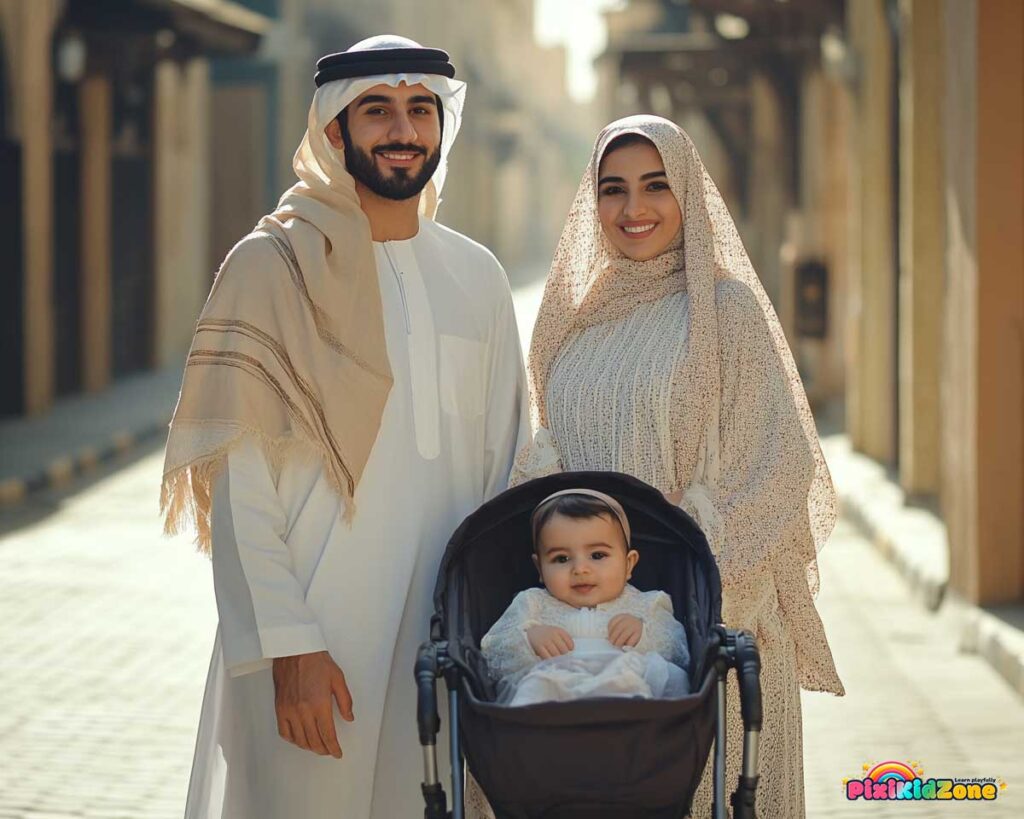
Apa arabul és Anya arabul
Anya arabul – أم (Umm)
Arabul az anya szó أم (Umm), kiejtése pedig “Omm”.
Az arab kultúrában az édesanyák központi szerepet töltenek be, gyakran a család szívének tekintik őket. Az arab nyelv ezt a mély tiszteletet szeretetteljes megszólításokkal fejezi ki, például „Umm + az elsőszülött neve”, amikor az anyát néha az elsőszülött gyermeke neve alapján szólítják, például Umm Ahmed (Ahmed anyja).
Apa arabul – أب (Ab)
Az arabban az apa szó أب (Ab), kiejtése pedig “Ab”.
Az arab kultúrában az apákat hagyományosan a család fejének tekintik, akik iránymutatásért és támogatásért felelősek. A anyákhoz hasonlóan az apák is tiszteletbeli címeket kapnak, gyakran „Abu + az elsőszülött neve”, például Abu Khalid (Khalid apja), ami jelképezi szerepüket és státuszukat a családban.
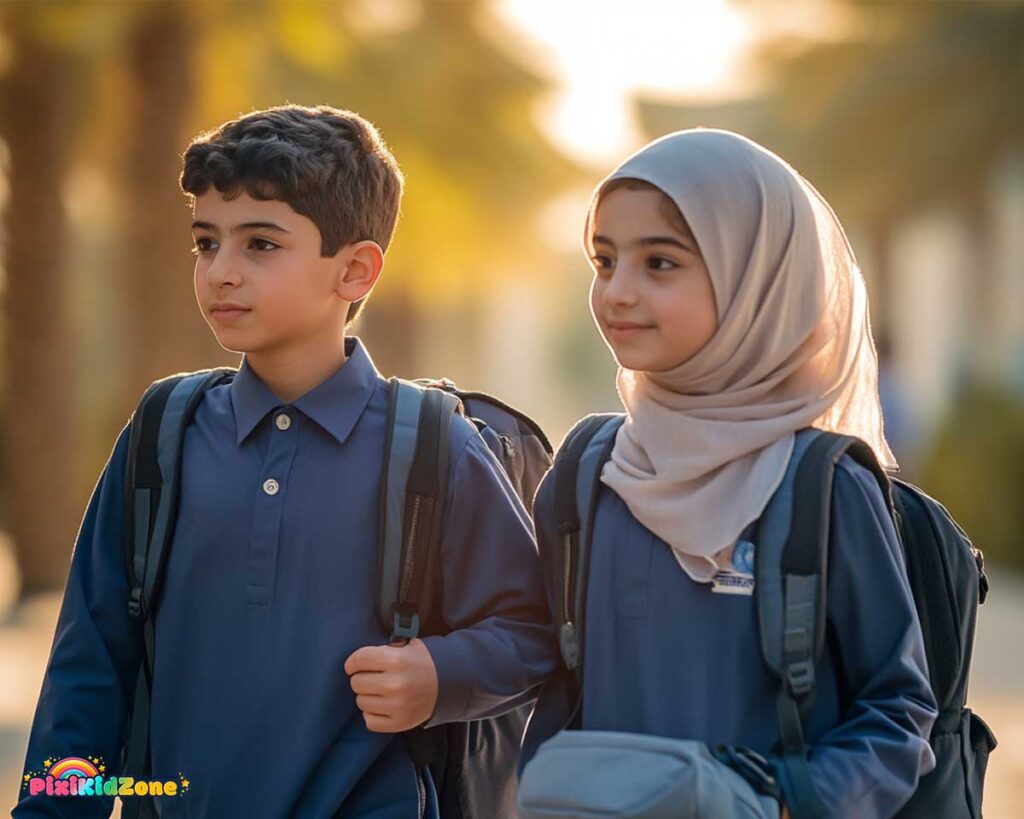
Fiú arabul és Lány arabul
Fiú arabul – ابن (Ibn)
Arabul a fiú szó ابن (Ibn), bizonyos dialektusokban pedig “Ibn” vagy “Bin” formában ejtik.
Az Ibn kifejezés nemcsak a mindennapi családi beszélgetésekben használatos, hanem történelmi és hivatalos kontextusokban is megjelenik, például nevekben (pl. Ibn Sina, ami Sina fia jelentést hordozza). A hagyományos arab társadalomban a fiakat gyakran a családnév és az örökség továbbvivőinek tekintik.
Lány arabul – بنت (Bint)
Az arabban a lány szó بنت (Bint), kiejtése pedig “Bint”.
Az Ibn-nel ellentétben, amelyet gyakran teljes nevekben használnak, a Bint leszármazási megnevezésekben jelenik meg, például „Bint Ali”, ami Ali lánya jelentést hordozza. Történelmileg ezt a kifejezést nemesi családokban használták az ősök hangsúlyozására. Sok arab családban a lányok különleges helyet foglalnak el és gyakran kapnak kedves beceneveket.
Arabic Word for Brother and Sister
Brother in Arabic – أخ (Akh)
In Arabic, the word for brother is أخ (Akh), pronounced as “Akh” (with a soft “kh” sound, like the German “Bach”).
In Arab culture, the bond between siblings is highly valued. An older brother (Akh Kabeer – أخ كبير) often takes on a protective and guiding role within the family, while younger brothers (Akh Sagheer – أخ صغير) are expected to show respect and follow their elders’ advice.
Sister in Arabic – أخت (Ukht)
The Arabic word for sister is أخت (Ukht), pronounced as “Ukht”.
Sisters hold a special place in Arab families, often taking on nurturing roles. An older sister (Ukht Kabeera – أخت كبيرة) is traditionally viewed as a second mother, offering guidance and care, while younger sisters (Ukht Sagheera – أخت صغيرة) are usually pampered and protected by their siblings.
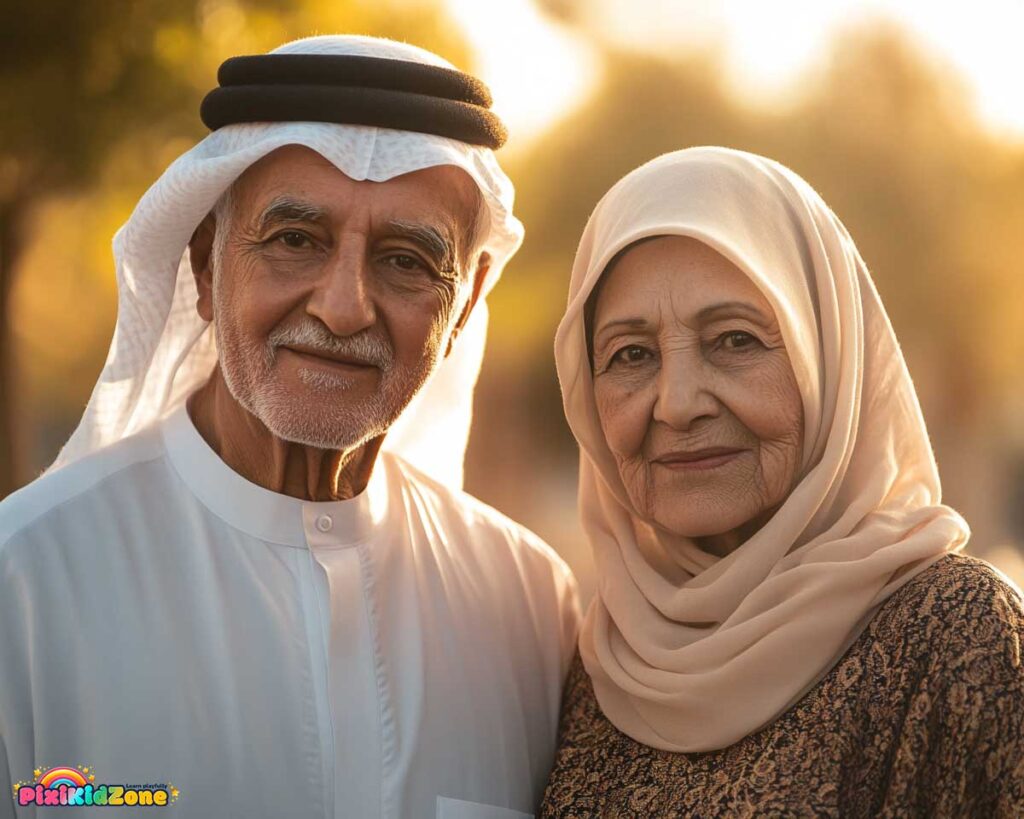
Arabic Word for Grandfather and Grandmother
Grandfather in Arabic – جد (Jadd)
In Arabic, the word for grandfather is جد (Jadd), pronounced as “Jadd”.
Grandfathers are highly respected in Arab families, often seen as the family’s wisdom keepers. They play an important role in passing down traditions, stories, and values. In some regions, affectionate terms like “Jiddi” (جدي) or “Sidi” (سيدي) are used to address grandfathers, reflecting deep respect and closeness.
Grandmother in Arabic – جدة (Jadda)
The Arabic word for grandmother is جدة (Jadda), pronounced as “Jadda”.
Grandmothers are often the heart of the household, known for their hospitality and love, especially when it comes to cooking! In some dialects, grandmothers are lovingly called “Teta” (تيتا) or “Jiddati” (جدتي). Their role extends beyond the family, as they often serve as the unifying force keeping multiple generations connected.
Arabic Word for Uncle and Aunt
Uncle in Arabic – عم (Am) / خال (Khal)
In Arabic, there are two different words for uncle, depending on whether he is from the father’s or mother’s side:
- عم (Am) – Paternal uncle (father’s brother), pronounced as “Am”
- خال (Khal) – Maternal uncle (mother’s brother), pronounced as “Khal”
Uncles often play a significant role in Arab families, acting as second fathers. The عم (Am), being from the father’s side, is often seen as an authoritative figure, while the خال (Khal) is traditionally known for being more affectionate and easygoing.
Aunt in Arabic – عمة (Amma) / خالة (Khala)
Just like with uncles, Arabic distinguishes between aunts from the paternal and maternal sides:
- عمة (Amma) – Paternal aunt (father’s sister), pronounced as “Amma”
- خالة (Khala) – Maternal aunt (mother’s sister), pronounced as “Khala”
Aunts, especially maternal ones (Khala), often take on a nurturing and caring role in a child’s life. The “Khala” is sometimes considered a second mother, while the “Amma” can hold a more traditional role within the extended family structure.
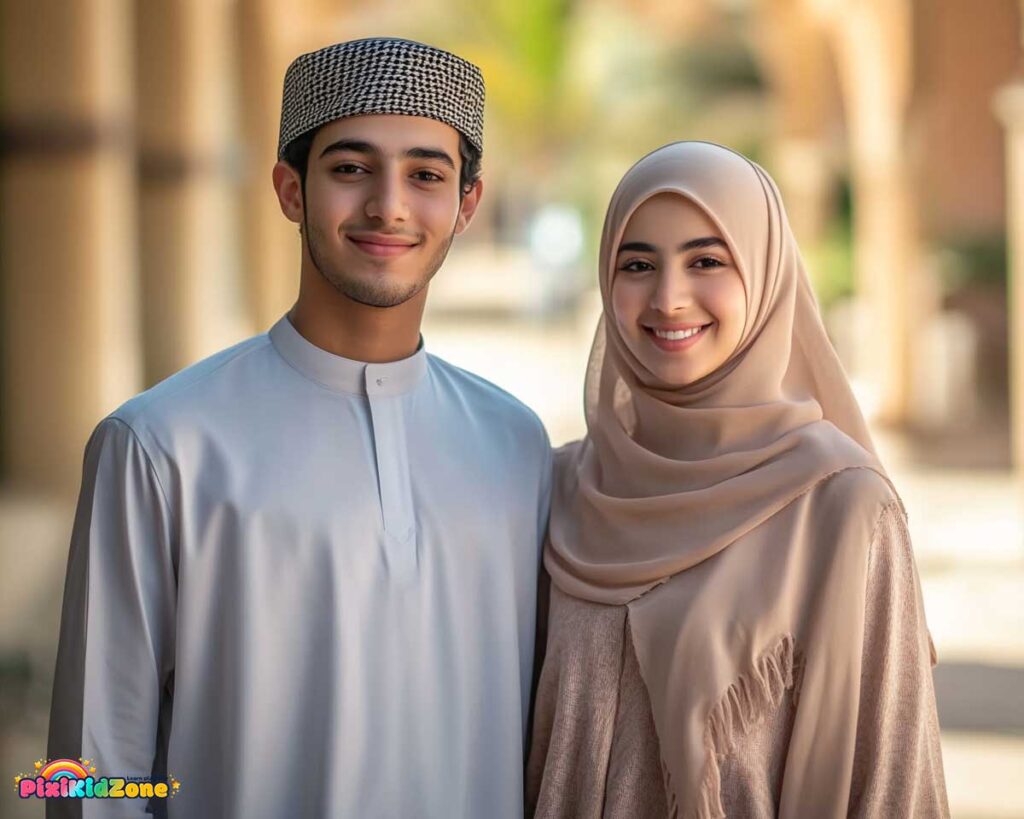
Arabic Word for Cousin (Male and Female)
Male Cousin in Arabic – ابن عم (Ibn Am) / ابن خال (Ibn Khal)
In Arabic, the word for male cousin depends on whether he is from the father’s or mother’s side:
- ابن عم (Ibn Am) – Paternal cousin (father’s brother’s son), pronounced as “Ibn Am”
- ابن خال (Ibn Khal) – Maternal cousin (mother’s brother’s son), pronounced as “Ibn Khal”
Cousins in Arab families are often as close as siblings, and in some cases, they even grow up together. Historically, in many Arab cultures, paternal cousins (especially Ibn Am) were considered potential marriage partners due to strong family ties and traditions.
Female Cousin in Arabic – بنت عم (Bint Am) / بنت خال (Bint Khal)
Similarly, the word for female cousin also changes depending on which side of the family she is from:
- بنت عم (Bint Am) – Paternal cousin (father’s brother’s daughter), pronounced as “Bint Am”
- بنت خال (Bint Khal) – Maternal cousin (mother’s brother’s daughter), pronounced as “Bint Khal”
Female cousins share a special bond in Arab families, often being treated as sisters. Just like with male cousins, Bint Am was traditionally seen as a close family connection, sometimes even a future spouse in arranged marriage traditions. However, in modern Arab society, cousin relationships are more about family unity and lifelong friendships.
Arabic Word for Grandson and Granddaughter
Grandson in Arabic – حفيد (Hafeed)
In Arabic, the word for grandson is حفيد (Hafeed), pronounced as “Hafeed”.
Grandsons hold a special place in Arab families, often being cherished and spoiled by their grandparents. In many cases, grandparents play an active role in raising and mentoring their grandsons, passing down traditions, stories, and wisdom.
Granddaughter in Arabic – حفيدة (Hafeeda)
The Arabic word for granddaughter is حفيدة (Hafeeda), pronounced as “Hafeeda”.
Granddaughters are equally adored, often receiving special attention from their grandmothers, who teach them family traditions, cooking secrets, and cultural values. In some Arab families, the first granddaughter even takes on a special role as the “little queen” of the household, bringing joy to everyone.
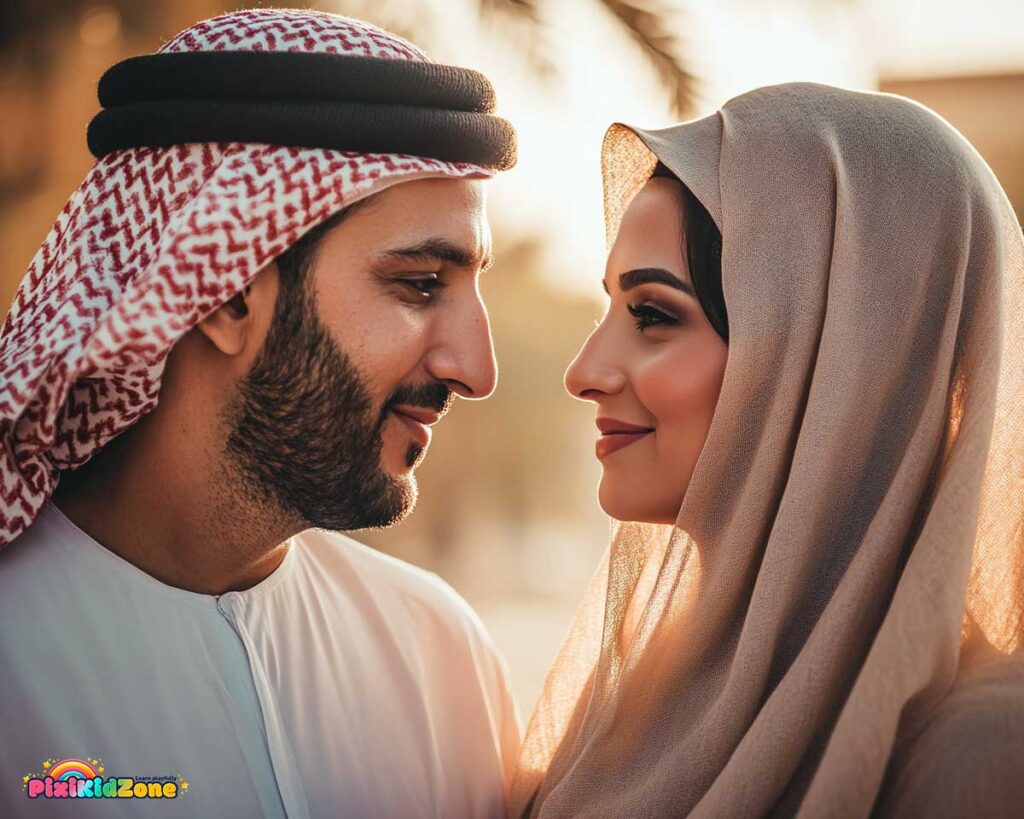
Arabic Word for Husband and Wife
Husband in Arabic – زوج (Zawj)
In Arabic, the word for husband is زوج (Zawj), pronounced as “Zawj”.
Marriage is highly valued in Arab culture, and the role of a husband extends beyond being a life partner—he is traditionally seen as the provider and protector of the family. The word “Zawj” can also mean “pair” in Arabic, emphasizing the idea of partnership and unity in marriage.
Wife in Arabic – زوجة (Zawja)
The Arabic word for wife is زوجة (Zawja), pronounced as “Zawja”.
Wives in Arab families hold an essential role, often seen as the heart of the home. In many traditional settings, the wife is responsible for maintaining family bonds, raising children, and preserving cultural traditions. The word “Zawja” comes from the same root as “Zawj”, reinforcing the idea that husband and wife are two halves of a whole.
Now You Know How to Address Someone in Arabic!
Learning Arabic family terms is not just useful for language learning—it’s a real cultural gateway. In Arab families, kinship ties mean much more than just blood relations—they shape social interactions, forms of respect, and even daily greetings.
If you ever visit an Arab family, you won’t be surprised to find that uncles and aunts have different specific titles, or that “Abu” and “Umm” (Father and Mother) are often followed by the name of their firstborn child. And if you ever ask, “How are these two related?”, you’ll quickly realize that it’s best to sit down and grab a notebook.
Now that you know the most important Arabic family words, maybe it’s time to try using them in a conversation. Who knows? The next time an Arab grandmother smiles at you, you might just know exactly how to address her. 😉
Ezeket olvastad már?
Szeretnél többet megtudni az egyiptomi arabról? Tudd meg, milyen nyelvet beszélnek valójában az egyiptomiak! https://pixikidzone.com/hu/blog/speak-the-egyptian-language-but-wait-what-language-do-they-actually-speak/
Kíváncsi vagy, hogyan kérdezd meg arabul, hogy „Hogy vagy?”? Ismerd meg a legudvariasabb kifejezéseket! https://pixikidzone.com/hu/blog/arabic-for-how-are-you-learn-how-to-ask-politely/
Elgondolkodtál már azon, milyen az arab káromkodás? Fedezd fel őket a marokkói és a Perzsa-öbölbeli dialektusokban, kiejtéssel együtt! https://pixikidzone.com/hu/blog/swear-words-in-arabic-from-moroccan-to-gulf-with-pronunciation/

 Magyar
Magyar



 English
English 简体中文
简体中文 Español
Español Deutsch
Deutsch Português
Português Русский
Русский Français
Français हिन्दी
हिन्दी العربية
العربية











